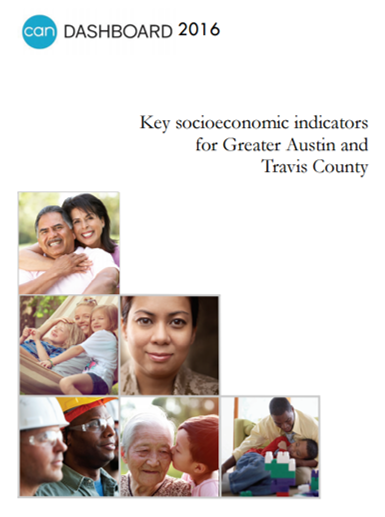
The Austin metro area has emerged from the recession as one of the fastest growing cities in the nation with community-wide improvements on many socioeconomic fronts. However, disparities by race, ethnicity, income and geography continue, and despite a strong economy, the region faces many persistent challenges that must be addressed to build a community of equity and opportunity.
This year’s CAN Dashboard report highlights many positive social, health, educational and economic trends. Since 2010, nine of the 17 socioeconomic indicators the report measures are on track to meet the community’s target. For example, Travis County’s combined property and violent crime rate continued to decline, dropping by 25% from 2010 to 2014, far exceeding the community goal of an annual 1% reduction in crime. Another positive trend is the increased rate of health coverage for individuals throughout Central Texas. In Travis County, the percent of people under the age of 65 who lack health insurance decreased from 22% in 2010 to 18% in 2014, meaning greater access to care, expanded coverage and more choices for members of our community. Finally, the annual unemployment rate hit an unprecedented low of 3.2% in 2015.
Unfortunately, this year’s report also shows some critical indicators moving in the wrong direction. The poverty rate in Travis County appears to have increased in 2014 for the first time since 2010. Though sample sizes are too small to be conclusive, this is a trend to watch. There was also a significant decline in the percentage of Central Texas kindergarten students who were school ready. While more than half of kindergarteners met this measure of social/emotional, language, early literacy, and mathematic ability in 2014, only 41% were school ready in 2015. And while more students are graduating from high school, the percent who earn a post-secondary degree remains unchanged. This is a critical indicator given the qualifications for the types of jobs that are difficult to fill in our region.
“Individuals who do not continue past high school are finding it increasingly difficult to succeed in Austin’s economy,” said Jeremy Martin, 2016 CAN Board Chair and Senior Vice President of Strategy for the Greater Austin Chamber of Commerce. “It is critical that we prepare students for jobs of the future. We need to make sure students are equipped with the education, training and skills needed to not only pursue, but complete post-secondary certifications and degrees.”
The seventh annual CAN Dashboard report and www.CANcommunitydashboard.org, provide an overview of the social, health, educational and economic well-being of Travis County and the greater Austin area. The report charts progress by tracking 17 indicators to gauge whether we are getting closer to achieving our community vision of promoting equity and opportunity for all, by answering four questions: Are we safe, just & engaged? Are we meeting our basic needs? Are we healthy? Are we achieving our full potential? Unfortunately, for many Central Texas residents, the answer to these questions is “no.” For this reason, this year’s report includes a new Equity Analysis to highlight disparities by race, ethnicity and income across many indicators.
“The new equity section of the CAN Dashboard allows CAN to present a more comprehensive picture of equity and opportunity for Austin and Travis County by diving more deeply into disparities in the outcomes and experiences of low income families and people of color in our community,” said Raul Alvarez, Executive Director, Community Advancement Network. “Until our income, health and educational success are not predicted by the color of our skin or the neighborhood we live in, there is much work to be done.”
Please join us for the release of the 7th Annual Dashboard Report on Thursday, June 2nd at 9 a.m. in the Austin City Hall Media Room. For more information, visitwww.CANcommunitydashboard.org, or contact CAN’s Executive Director, Raul Alvarez atralvarez@canatx.org or 512-785-0492.